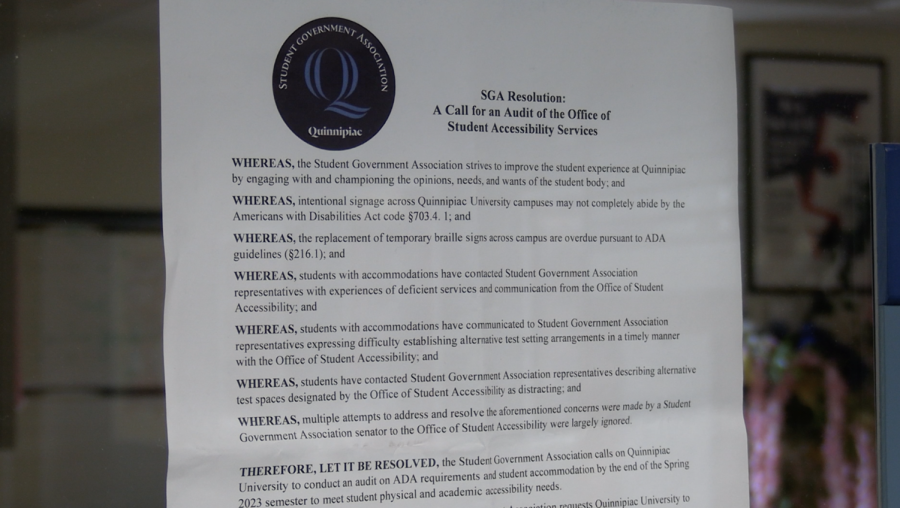University plans for student-led “Accessibility Advisory Board”
January 28, 2023
On Nov. 9, Quinnipiac University Chief Experience Officer Tom Ellett responded to a Student Government Association (SGA) resolution about concerns for student accessibility with potential solutions for the university.
In the emailed response to SGA, Ellett explained how the university is committed to being accessible to the whole school community.
The resolution, which was released on Oct. 26, called on the university to improve the student experience for those with accommodations. It was written by SGA Sophomore President, Thomas Peters.
“Our main mission is to advocate on behalf of students,” Peters said. “If we can’t advocate through a conversation because we are not being heard, we have to take it to the next step and do a formal resolution.”
The resolution mentions braille signs on campus that do not abide by the most recent Americans with Disabilities Act (ADA) standards and limited and low quality alternative testing spaces. It demanded changes be made before the end of the Spring 2023 semester.
Ellett and Director of the Office of Student Accessibility Kate Palumbo met with SGA representatives to discuss ways of addressing these concerns. They agreed to form a student-led advisory committee that will start in the Spring of 2023.
“Among the goals of this committee are promoting regular lines of communication that address questions and concerns, improve community awareness of access and the means to achieve it, and evaluate opportunities for student accessibility,” Ellett wrote.
Palumbo says the Office of Student Accessibility tries their best to address all challenges students face, saying they were not aware of these issues. The braille signage problem was introduced by a Quinnipiac Chronicle article, which pushed Palumbo’s office to work with facilities to change the signs.
The student-led advisory committee is being organized by Palumbo, who says she wants to include students with and without disabilities, along with family members and representatives from offices across campus who are directly involved, like Public Safety and Counseling Services. She imagines the group meeting twice a semester to discuss issues they are seeing, as well as information from experts.
“I think having kind of a cross section of various folks across campus would be helpful to come together throughout the semester to talk about some of the statistics and the data,” Palumbo said.
In addition to the advisory committee, Ellett stated that braille signs will be replaced over the summer due to supply chain issues.
“Obviously with issues with the supply chain, we can’t get absolutely everything at once,” Peters said. “It will take time and they have projected it will take until Summer of 2023 and we are going to hold them accountable to that.”
He also urged students to contact the Office of Student Accessibility if they have any concerns about their accommodations.
Any students interested in joining the advisory board should contact Kate Palumbo.







